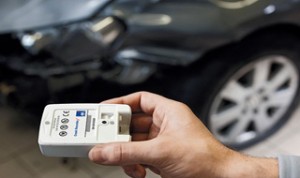Control of car data at stake in Bill Monning bill
by Jeremy B. White, Sacramento Bee
 Foreshadowing a clash between car makers and a prominent auto insurance company, Sen. Bill Monning, D-Carmel, on Tuesday unveiled a bill to loosen car manufacturers’ grip on data generated by vehicles.
Foreshadowing a clash between car makers and a prominent auto insurance company, Sen. Bill Monning, D-Carmel, on Tuesday unveiled a bill to loosen car manufacturers’ grip on data generated by vehicles.
Framed by a computer-equipped car parked on the steps of the State Capitol, Monning said his Senate Bill 994 would allow consumers to see what data their car generates and decide with whom they want to share the information. The measure is sponsored by AAA Northern California and its south state counterpart, the Auto Club of Southern California.
“It is your car, it is your data, and it should be your choice,” Monning said.
Cars have evolved beyond simple conveyances of steel and rubber into transmitters of data, capturing driver statistics that can include, where and how fast a person drives, the number of passengers in a car to the road tunes a driver is playing.
Currently, car manufacturers control that data. Monning said the bill will let consumers see what information is emanating from their cars and allow them to share it with, for instance, an auto mechanic.
“If I have a car problem, a red light on the dash board, I want to be able to take that to a repair service that with my authority they could access that data to make a repair,” Monning said.
The legislation has already prompted a public relations counteroffensive from automakers, who call the bill an insurance industry ploy to gain access to consumer information that could be resold or invoked to raise insurance rates.
“This is about AAA wanting to suck the data out of your car,” said Rob Stutzman, who is working for the Alliance of Automobile Manufacturers on the bill.
In response to those concerns, Monning said his bill preserves a segment of California law that prohibits insurers from using data other than mileage to set rates. Law enforcement could still obtain car data if they went through the necessary legal process.
If a consumer enables another company to see his or her car data, that company could conceivably pass that data along to someone else – but only, Monning said, if the consumer signs off.
“I would expect in that conversation and in that contract, I’d want to make sure they’re not going to share it with anyone else,” Monning said.
There’s also a question of data security. In a world where cars are increasingly interconnected, Stutzman said, giving third parties access to reams of car-generated information would undermine privacy protections.
“There’s no question that privacy is an issue and how the data handled is an issue, but this bill would completely obliterate any process moving forward to make sure you have protected data,” said Stutzman.
Advocates of connected car technology say that allowing cars to talk to one another would improve traffic efficiency and cut down on accidents. It is a concrete enough prospect that the U.S. Department of Transportation has an initiative looking at vehicle-to-vehicle communication, and California is contemplating regulations around driverless cars.
“We think we’re on the frontier of trying to get ahead of the technology revolution on this,” Monning said of his bill, pointing to “the greater potential of sharing information.”